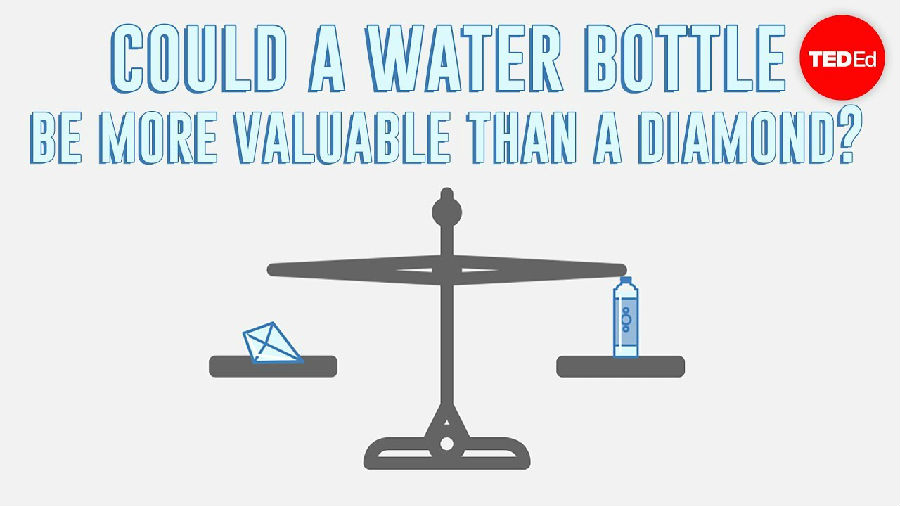(单词翻译:单击)
Imagine you're on a game show, and you can choose between two prizes: a diamond or a bottle of water.
假设有一档有奖竞猜节目,你可以从钻石和一瓶水水这两个奖项中任选一个。
It's an easy choice. The diamonds are clearly more valuable.
这之间的选择会十分容易。显而易见,钻石的价值要高于水。
Now imagine being given the same choice again,
现在设想你面临同样的抉择,
only this time, you're not on a game show, but dehydrated in the desert after wandering for days.
只不过这一次你不是在有奖竞猜节目中,而是在沙漠中漫步数日,严重缺水。
Do you choose differently? Why? Aren't diamonds still more valuable?
你的选择会有所不同吗?这又是因为什么呢?钻石的价值难道不是仍旧高于水吗?
This is the paradox of value, famously described by pioneering economist Adam Smith.
这就是著名的价值悖谬,最先由经济学先驱亚当·斯密提出。
And what it tells us is that defining value is not as simple as it seems.
它告诉我们,确定价值其实并不像看上去那么简单。
On the game show, you were thinking about each item's exchange value,
在有奖竞猜中,你所想的是物品的交换价值,
what you could obtain for them at a later time, but in an emergency, like the desert scenario,
也就是你之后能从中获得的价值,但是在生死关头,比如沙漠场景中,
what matters far more is their use value, how helpful they are in your current situation.
它们的使用价值更为重要,就是对你现在所处的情形有多大帮助。
And because we only get to choose one of the options,
因为我们只能从中选择一种,
we also have to consider its opportunity cost, or what we lose by giving up the other choice.
我们也要考虑它们的机会成本,也就是如果我们选择另外一种需要损失的东西。
After all, it doesn't matter how much you could get from selling the diamond if you never make it out of the desert.
归根结底,如果你根本就没有办法走出沙漠,卖掉钻石能得到什么并不重要。
Most modern economists deal with the paradox of value
大多数现代经济学家处理价值悖论的方式
by attempting to unify these considerations under the concept of utility,
是通过尝试使用效用这个概念一致化选择,
how well something satisfies a person's wants or needs.
也就是物品满足人们需求的程度。
Utility can apply to anything from the basic need for food to the pleasure of hearing a favorite song,
效用可以用来讨论任何事情,从基本的对食物的需求到听喜爱的音乐带来的快乐,
and will naturally vary for different people and circumstances.
并且自然而然地会因为人物和情境有所不同。
A market economy provides us with an easy way to track utility.
市场效用为我们提供了一种监测效用的简便方式。
Put simply, the utility something has to you is reflected by how much you'd be willing to pay for it.
简单来说,一件物品的效用是由你愿意为它支付的价值来反映的。

Now, imagine yourself back in the desert,
现在,假设你回到了沙漠,
only this time, you get offered a new diamond or a fresh bottle of water every five minutes.
只不过这一次每五分钟,你就被提供一颗新的钻石或者一瓶新的水。
If you're like most people, you'll first choose enough water to last the trip, and then as many diamonds as you can carry.
如果你像大多数人一样,你会先选择足够自己旅程的水,接下来选择尽可能多的钻石。
This is because of something called marginal utility,
这是因为边际效用,
and it means that when you choose between diamonds and water,
它的意思是,在对钻石和水进行权衡时,
you compare utility obtained from every additional bottle of water to every additional diamond.
你把每多一瓶水得到的效用和每多一颗钻石得到的效用进行比较。
And you do this each time an offer is made.
每提供一次水和钻石,你就会做一次这样的比较。
The first bottle of water is worth more to you than any amount of diamonds,
第一瓶水对你来说比多少钻石都要重要,
but eventually, you have all the water you need.
最终你会得到足够的水。
After a while, every additional bottle becomes a burden.
一段时间后,每多一瓶水都变成了一个负担。
That's when you begin to choose diamonds over water.
那时候你就开始选择钻石,而不是水。
And it's not just necessities like water.
这不仅仅适用于必需品,比如水。
When it comes to most things, the more of it you acquire, the less useful or enjoyable every additional bit becomes.
对于大多数物品,得到的越多,每一单位增加的有用或者享受程度就会减少一些。
This is the law of diminishing marginal utility.
这就是边际效用递减规律。
You might gladly buy two or three helpings of your favorite food,
你可能会很乐意购买两份或者三份最喜欢的食物,
but the fourth would make you nauseated, and the hundredth would spoil before you could even get to it.
但是第四份就会使你不舒服,第一百份大概会在你吃到之前就已经变质了。
Or you could pay to see the same movie over and over until you got bored of it or spent all of your money.
或者你可以花钱去看同一场电影,直到看腻了,或者是花光了所有钱。
Either way, you'd eventually reach a point where the marginal utility for buying another movie ticket became zero.
不管是选择哪一种,你最终都会到达购买另一张电影票的边际效用为零的那个点。
Utility applies not just to buying things, but to all our decisions.
效用不仅仅是关于买东西,更是关于我们做出的所有决定。
And the intuitive way to maximize it and avoid diminishing returns is to vary the way we spend our time and resources.
一个简单的办法来最大化效用并避免递减的收益是不断改变我们花费时间和资源的方式。
After our basic needs are met,
在满足基本需求之后,
we'd theoretically decide to invest in choices only to the point they're useful or enjoyable.
理论上我们会决定只投资对我们有帮助或者会带来愉悦的商品数量。
Of course, how effectively any of us manage to maximize utility in real life is another matter.
当然,我们中的每个人在现实生活中会通过怎样的办法来最大化效用就是另一回事了。
But it helps to remember that the ultimate source of value comes from us,
但是重要的一点是,价值的最终来源是我们,
the needs we share, the things we enjoy, and the choices we make.
我们共享的需求,我们享受的东西以及我们做出的决定。


